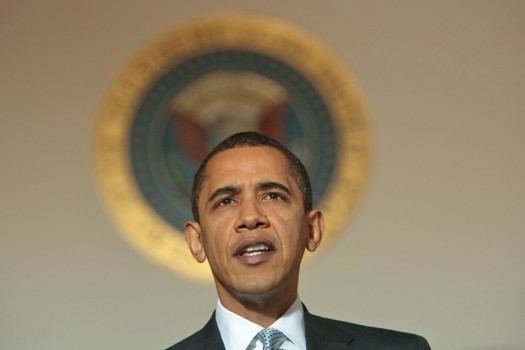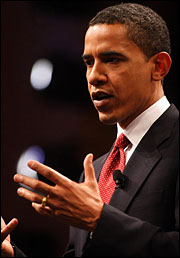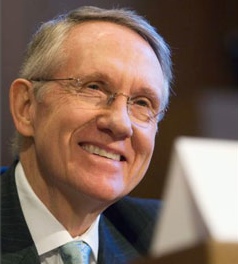Climate Politics
All Stories
-
Obama considering ‘cash-for-clunkers’ program
President Obama discusses the latest efforts to aide the U.S. auto industry. (White House photo) Did President Obama endorse a “cash for clunkers” program today? Maybe. In detailing the government’s latest efforts to shore up General Motors and the U.S. auto industry, Obama said this: Finally, several members of Congress have proposed an even more […]
-
Obama calls for climate summit of the world’s biggest polluters
President Obama on Saturday announced that the United States is initiating a Major Economies Forum that will focus on energy and climate change, an attempt to bring the world’s biggest polluters together to discuss a path forward. “The Major Economies Forum will facilitate a candid dialogue among key developed and developing countries, help generate the […]
-
Doom, lobbyists, hypocrisy, and coal, oh my!
• Scientists now say that even stabilizing at a global average temperature level of 2C above pre-industrial — a commonly agreed upon goal that looks increasingly remote — will give us only a 50/50 chance of avoiding catastrophe. Awesome! • Let me officially become the last person on the internet to link to the excellent […]
-
-
Reid says Dems might use carbon-credit revenues to fund health care
Could the revenue from auctioning off carbon credits be used to pay for a new health-care system? Bloomberg reports: Senate Majority Leader Harry Reid [D-Nev.] said he is open to financing an overhaul of the U.S. health-care system with revenue generated from efforts to rein in greenhouse gas emissions. Reid, a Nevada Democrat, told reporters […]
-
In lead-up to Bonn climate talks, U.S. and U.N. leaders are cautiously optimistic
Climate leaders in both Congress and the United Nations are optimistic about making landmark progress on an international climate accord this year, but hopes that an agreement will be finalized in 2009 seem to be dimming. Yvo de Boer, the U.N. climate chief, and Rep. Ed Markey (D-Mass.), chair of the Energy and Environment Subcommittee […]
-
New study quoted by Cato Institute deniers in ad concludes global warming is getting worse
RealClimate has an excellent post (here) on the Cato Institute’s efforts to get signatories for its new global warming denial ad. But they missed one especially ironic point — a key study Cato uses to argue we may see much less warming than the models predict comes to exactly the opposite conclusion. The Cato Institute […]
-
Why conservatives hate green jobs
This post will debunk “7 Myths About Green Jobs” and the longer version, Green Jobs Myths [PDF]. The internal inconsistencies and general illogic of these articles are staggering: Progressives will be quoting from them in defense of our positions for years to come (see debunking of Myth 6). These two articles survey and critique the […]
-
The latest deceptive ad from the ‘clean’ coal front
The latest ad from the American Coalition for Clean Coal Electricity. Note that they don’t even bother mentioning the “clean” part until the logo at the very end.
-
The battle for control of Eurasia will shape the new world order
This is a guest post by Pepe Escobar, the roving correspondent for Asia Times and an analyst for the Real News. This article draws from his new book, Obama does Globalistan. He may be reached at pepeasia AT yahoo.com. This post was originally published at TomDispatch, and it is republished here with Tom’s kind permission. […]


